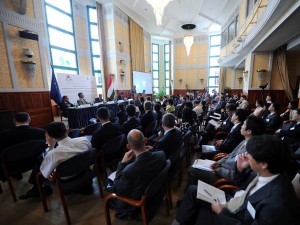
Participants of the ASEM (The Asia–Europe Meeting) Sustainable Development Dialogue listen to an opening speech, presented by Hungarian Foreign Ministers Janos Martonyi in the ministry of Foreign Affairs in Budapest on June 21, 2012 during the official opening session. The first sustainable development conference on the role of water in sustainable regional development strategies is a co-operative and comprehensive interaction among the regions of Danube River and Mekong River. AFP
BANGKOK—Debt-laden European nations will lobby Asia’s economic dynamos for help to calm the crisis raging in the eurozone at a major summit next week in communist Laos, one of the world’s poorest countries.
A heavyweight contingent including French President Francois Hollande and Italian Prime Minister Mario Monti is due at the two-day meeting that opens on Monday, underscoring Europe’s growing engagement with Asia’s rising stars.
The Europeans “are aware of Asia’s growing importance as an engine of global economic growth”, said a Southeast Asian diplomat who asked not to be named.
“They will take this chance at the summit level to assure Asia that although there’s no immediate solution to the debt crisis, the monetary union is not going to break up,” he told Agence France-Presse.
The Asia-Europe Meeting (ASEM), held every two years since 1996, will provide a platform for Europe’s leaders to strengthen trade and investment links at a crucial juncture for their crisis-hit region.
“When Europe is in trouble, global concern sets in,” French Labour Minister Michel Sapin said ahead of the summit.
“We have to show the world that Europe is not going backwards but is moving forward,” he told AFP on a recent trip to Vietnam.
About 50 leaders or their representatives are expected to stream into the normally sleepy Laos capital Vientiane to attend the gathering, which comes against a backdrop of improving ties between Europe and Southeast Asia thanks to a series of dramatic political reforms by former pariah Myanmar.
Outrage in the West over human rights abuses by the generals who ran Myanmar for decades — including the detention of Nobel laureate Aung San Suu Kyi and other political prisoners — soured the atmosphere of past ASEM meetings.
But since a reformist government took power last year, freeing hundreds of political detainees and welcoming Suu Kyi into mainstream politics, the West has begun rolling back sanctions and foreign firms are lining up to invest.
European Union president Herman Van Rompuy and European Commission chief Jose Manuel Barroso are among those set to jet into Laos, a poor but fast-growing country of just six million people which is on the verge of joining the World Trade Organisation after years of preparation.
Asia’s economies have not been immune to the fallout from the debt crisis lashing Europe, with China and other exporters suffering from weaker demand for their products in key Western markets.
Beijing has repeatedly expressed concern about the EU slowdown and offered help in resolving the debt crisis, but at the same time has been increasingly forced to take costly stimulus steps of its own to sustain growth.
Europeans also have expressed hope that China could deploy some of its trove of about $3 trillion in foreign exchange reserves — the largest in the world — to invest in EU bailout funds.
“The eurozone crisis has heightened both sides’ awareness of their economic interdependence: Europeans need Asia’s still-growing markets to boost flagging growth while Asians recognise their vulnerability to eurozone woes,” said Shada Islam, head of policy at the Brussels-based think tank Friends of Europe.
The European diplomatic offensive follows increased engagement in the region by US President Barack Obama to counter the rise of an assertive China.
Some Asian participants — such as Japan, the Philippines and Vietnam — have pushed to put Asia’s maritime sovereignty disputes on the agenda at the Laos summit, according to observers.
Europe has become “the battleground for a major lobbying campaign by some of the Asian rivals” over the maritime issue, according to David Fouquet, senior associate at the European Institute for Asian Studies in Brussels.
But Europe has been reluctant to wade into the row, he added.
With territorial tensions simmering between Asia’s two largest economies, China’s Premier Wen Jiabao has no plan to meet his Japanese counterpart at the Laos summit, according to Beijing.